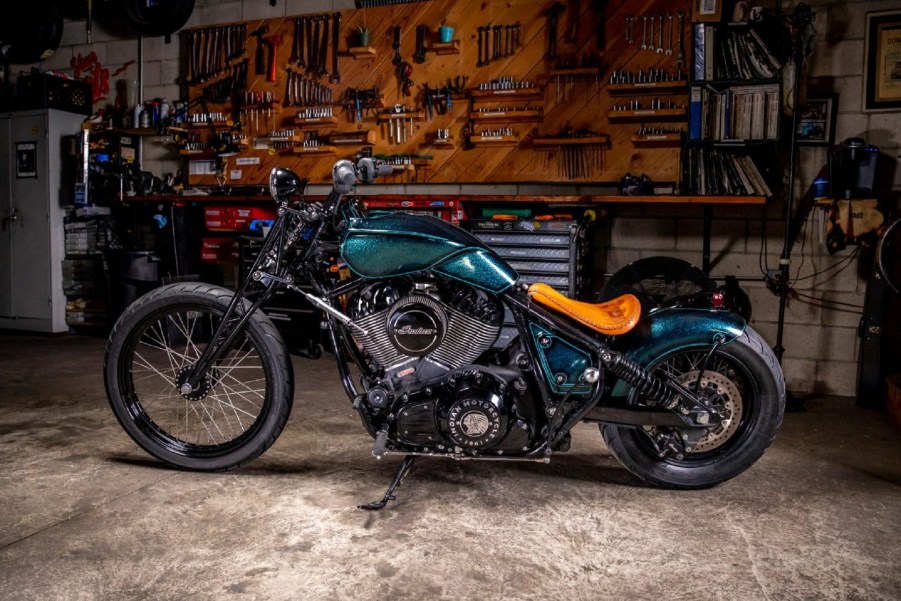
This Custom 2022 Indian Chief Rocks a Vintage-Style Hand Shifter
Earlier this year, Indian announced that it was bringing together several celebrated bike builders to create custom 2022 Chiefs. Now, the motorcycles built for this collaboration are starting to break cover. One of the first to do so is the creation of a legendary duo: Paul Cox and Keino Sasaki. And while their custom Indian Chief is a modern motorcycle, it boasts a truly vintage touch.
Paul Cox and Keino Sasaki came back together to craft a custom 2022 Indian Chief

Some of the 2022 Indian Chief’s main design inspirations were vintage custom bikes, specifically early choppers and bobbers. So, for their build—their first together in nearly 15 years—Paul Cox and Keino Sasaki decided to send the Chief further down that ‘early chopper’ road. And they also wanted to make sure the final product had each builder’s unique touches.
The resulting custom Indian Chief, dubbed ‘Cox-Keino Chief,’ accomplishes all of those things. It doesn’t have a front braking system anymore—that’s been ‘chopped’ off—but it does have Cox’s signature two-shock ‘Girdaulic’ girder front end, Cycle World notes. And there’s a side-mounted steering damper up front, too. Cox also hand-tooled the leather saddle and painted the bike, RideApart reports.
Meanwhile, Keino Sasaki hand-fabricated the steel gas tank and the flat-track-inspired exhaust pipes. Speaking of the gas tank, it houses the 2022 Indian Chief’s 4” TFT touchscreen. And all of the bike’s standard electronics are still in place: they’re just hidden away.

Despite its chopper design, this custom Indian Chief has the same rear suspension travel as the stock bike. However, that required mounting the rear fender to the swingarm, so this motorcycle can’t carry a passenger, RideApart notes. But while it has spoked wheels like the 2022 Chief Bobber, the Cox-Keino Chief has a 21” front tire, not a 16” one. The custom bike does retain the ‘Chief headdress,’ though, but it’s now the rear taillight/brake light.
But Paul Cox and Keino Sasaki went a little further still in making their custom Indian Chief. Besides chopping off the front brake system, they also removed the clutch lever. While that gives the bike a clean look, it presumably means there’s no way to shift gears.
Well, not exactly.
Giving a modern custom Indian Chief a hand shifter is a true motorcycle throwback
True, most modern bikes rely on a foot-operated shifter and a hand-operated clutch to change gears. However, Cox’s and Sasaki’s custom Indian Chief uses something usually only seen on vintage motorcycles: a hand shifter with a foot-operated clutch.
While this arrangement seems odd today, motorcycles with hand shifters were once a common sight. The famed 101 Indian Scout, for example, has one. Indeed, hand shifters’ roots go back to motorcycling’s earliest days.
Very early bikes, such as board-track racers, didn’t have transmissions or even clutches. Instead, to keep their motorcycles from stalling, riders put tension on the leather drive belts using lever-controlled pulleys, RevZilla explains. These levers were hand-operated and usually mounted to the side of the gas tank. So, when motorcycles eventually gained transmissions, these levers morphed into hand shifters.
Since the rider’s hands were busy shifting gears as well as controlling the throttle and ignition timing, the clutch controls needed to be foot-operated. Some call these clutches ‘suicide clutches,’ based on the notion that worn clutches could slip and send bikes barreling towards traffic. However, that appellation really only applies to hot-rodded clutches, which had missing parts for weight-reduction and acceleration purposes, RevZilla says.
So, while Cox’s and Sasaki’s custom Indian Chief has a hand shifter, riding it isn’t a suicidal notion.
Can you do something similar on your bike?

The Cox-Keino Chief already has an owner, renowned tattoo artist Nikko Hurtado. But you can give your modern motorcycle a hand shifter, too. And it’s not just for those who want to ride vintage-style. I’ve met an older rider who installed one on his ‘90s Harley-Davidson because his arthritis prevented him from using the clutch lever.
In terms of cost, it depends on your bike’s make and model. For comparison, Widow Maker Industries’ Harley-Davidson hand shifter kits start at $240 and run to $450. And the company claims it takes less than an hour to install.
Who knows, perhaps Paul Cox’s and Keino Sasaki’s build will start a new wave of hand-shifting bikes.
Follow more updates from MotorBiscuit on our Facebook page.


